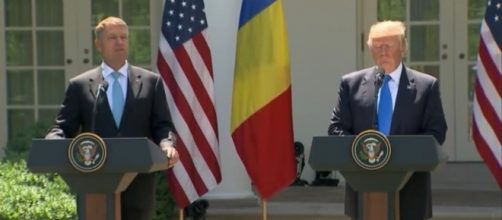In House Speaker Paul Ryan's statements on the House floor, following Wednesday's attack on congressional leaders, Ryan said that "an attack on one is an attack on us all." In the same way, Article 5 of NATO's principles is a similar expression where an attack on one NATO nation is seen as an attack on all NATO nations. President Trump made that commitment from the White House lawn last Friday as he stood next to the President of Romania Klaus Iohannis.
President Trump changes stance on NATO
In his statement, President Trump said that he was committing the United States to Article 5 but he also made it an issue of monetary again as he has campaigned against other NATO states for claiming that they are "not paying" their fair share.
One report by CNN suggests that Trump could have expressed the U.S's commitment to Article 5 when he was at NATO headquarters in Brussels last month. In that speech, the President scolded NATO leaders for failing to meet their defense spending guideline. The last time Article 5 was triggered was in the 9/11 attacks leading to the war in Afghanistan against the Taliban.
As Iohannis stood next to him, he said that Romania was the first country to step up their spending for which Trump thanked him, saying that they all have to share the burden to fight against terrorism. Though terrorism seems to be a pressing issue for all governments, NATO member or not, most see the building tensions on the Russian a far more immediate threat.
Trump's threat to NATO nations
As Blasting News reported last year, after Donald Trump became President-elect, NATO nations moved troops to their borders in order to counter a possible attack by Russian forces. Vladimir Putin's Russia had reportedly also built up forces along the border claiming that they were attempting to fend off an attack by those member states.
However, Russia's conflicts in the Ukraine would suggest that Russian President Putin would be ready to invade NATO members. The Ukraine is not a member but Putin has threatened to retaliate if the Ukraine were to join.
Reasons for this are said to have something to do with Putin's ideology of rebuilding a kind of Soviet Union which collapsed in the early 90s.
Even more, Trump's possible connections to Russian officials who U.S. intelligence believe interfered with the presidential election also suggests that Trump would attempt to weaken NATO and give more strength to Putin. Much of the President's rhetoric has already done damage to the U.S. relationship with international allies who decided to go it alone with regards to the Paris Climate Accord which Trump announced he would withdraw the U.S. from. For the time being, the NATO alliance seems to be holding on.


